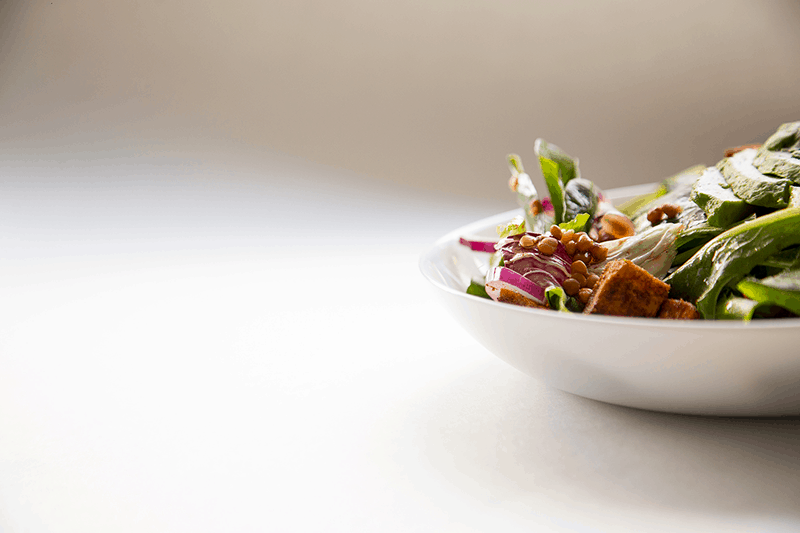Plant Based Diets Explained

Plant-based diets are gaining a lot of attention from the medical community.[1] With so many compelling reasons to replace the animal products and processed foods in your meals, it’s a great time to shift toward a whole food, plant-based diet.
What is plant-based eating?
In plant-based diets, meals and snacks are made primarily from plant sources. This means eating vegetables and fruit, along with whole grains, legumes, nuts, seeds, and plant oils such as extra virgin olive oil and other less refined plant oils. In other words, a larger proportion of your plate is filled with minimally processed, plant-based foods.
Plant-based diet vs. vegan diet
Although they sound similar, there are distinct differences between a plant-based and a vegan diet:
- A plant-based diet may include some animal products for their nutritional benefits.
- Vegan diets are void of all animal products, including those that could be hidden in prepared foods such as gelatin, honey, and whey.
- Whole food, plant-based eating focuses on foods in their natural state or that have been minimally processed.
- Vegans do not necessarily exclude processed foods such as vegan frozen meals.
Both ways of eating offer the nutritional benefits of plant-based foods.
Benefits of plant-based eating
The Harvard Medical School encourages healthy eating patterns that include foods mostly of plant origin. [2] Besides being cost-effective, a whole food, plant-based diet has many benefits, including the following:
- May help lower body mass index and maintain a healthy body weight. [3]
- Helps support healthy blood sugar levels in people with diabetes. [4]
- Supports healthy blood pressure and cholesterol levels. [3]
- Increases dietary fibre intake to lower the risk of chronic health problems. [5]
- Reduces saturated fat intake. [5]
A plant-based diet plan
A variety of delicious whole, plant-based foods are available, most of which are available in the produce section and bulk food aisle of your grocery store. Eliminating most processed and packaged goods from your meals will make grocery shopping a lot simpler.
When it comes to eating whole foods, there are foods you should choose most often, those you should choose less, and those you should avoid. Here are some examples.
Choose daily:
- Vegetables, such as leafy greens, broccoli, zucchini, peppers, and mushrooms
- Legumes, such as lentils, beans, and peas
- Starchy vegetables, such as potatoes, corn, squash, plantains, sweet potatoes, and yams
- Fruit, such as apples, pears, berries, melons, tomatoes, and avocadoes
- Whole grains, such as oats, brown or wild rice, quinoa, millet, and amaranth
- Nuts, such as almonds, walnuts, and peanuts
- Seeds, such as flax, pumpkin, and chia
- Herbs and spices, such as oregano, cilantro, cinnamon, pepper, ginger root, and turmeric
- Plant oils, such as virgin olive oil, cold-pressed coconut oil, and flaxseed oil
Choose less often:
- Meat, poultry, beef, fish, and shellfish
- Dairy products, such as milk, yogourt, cheese, and butter
- Eggs
- Fresh fruit juices
Avoid:
- Cold cuts and processed cheeses
- Refined foods, such as white flour products, commercial breakfast cereals and granola bars, cookies, candy, and chips
- Sugary beverages, such as pop, sweetened fruit juice, sports beverages, and energy drinks

Supplements for a plant-based diet
No matter how well you eat, adding a high-quality supplement to your diet can help fill nutritional gaps and make sure that you’re getting the complete range of nutrients needed for optimal health. This is the driving principle behind the Whole Earth and Sea line of supplements and proteins. It all starts with organic farming using our own non-GMO seeds. Then we process whole plants raw in special bio-activation chambers, which allows natural enzymes, probiotics, and prebiotics to culture our ingredients.
The result? An entire line that supports your healthy plant-based eating with the best certified organic and pesticide-free ingredients. The following nutrients in our Whole Earth and Sea line support a whole food, plant-based lifestyle:
Marine DHA
Whole Earth & Sea Marine DHA is a sustainable algae oil source of DHA that supports eye health and brain function. Extracted from specially selected Schizochytrium microalgae, this omega-3 oil has no fishy smell or aftertaste and is an excellent vegan alternative to fish oil supplements.
Deep Ocean Minerals
Deep Ocean Minerals is sustainably extracted from deep ocean water protected by a nature reserve. It contains over 70 essential minerals and trace elements, including magnesium, which catalyzes over 300 enzyme and hormone reactions. These macrominerals and trace elements give structure to your organs, tissues, and bones, and help maintain fluid balance, pH balance, and membrane permeability.
Multivitamins
Whole Earth and Sea offers a complete line of multi-vitamins to support you at any age or stage of your healthy life. From Women’s Prenatal, a comprehensive, whole-food-based supplement to support pregnant women, to Women’s and Women’s 50+ and Men’s and Men’s 50+ as well as Bone Structure, a calcium-rich whole food formula designed to strengthen bones, we’ve got you covered. All of our vitamins and minerals are non-GMO and are made from nutrient-rich plants grown on Natural Factors farms. They contain no corn or gluten.
Vitamin D3
People who follow vegan and vegetarian diets are more likely to lack vitamin D. [7] Whole Earth & Sea Pure Food Vegan Bioenhanced Vitamin D3 is a distinct non-GMO formula sourced from wild-harvested lichen. It contains cholecalciferol, the most bioactive form of vitamin D3, to help build strong bones. [8]
Vegetable blends
Many vegetables can be fermented to enhance their flavour and help release nutrients for absorption by the body. Delicious options include cabbage, radishes, soybeans, and green tea. Whole Earth & Sea Fermented Organic Protein & Greens contains a wide range of 100% fermented plant-based ingredients. It is a certified organic formula that contains 21 g of vegan protein per serving.
Organic Vegan Green Protein Bar
The Pure Food Organic Vegan Greens Protein Bar is the whole-food answer to healthy on-the-go nutrition. Each chocolate covered bar is 100% organic and made with 80% raw ingredients, providing 15 g of quality vegan protein in a low-glycemic formula. This great-tasting green superfood is designed to fuel your life and satisfy your hunger.
Although those following plant-based diets will choose fish less often, a sustainably sourced omega 3 oil can offer great antioxidant benefits from naturally occurring asthaxanthin. Both Whole Earth & Sea Herring Gold and Cogni Hi-Q have been independently certified by the Marine Stewardship Council, whose mission it is to conserve marine habitats.
Herring Gold
Whole Earth & Sea Pure Food Herring Gold comes from sustainably harvested, spring-spawning Norwegian herring roe. It is a natural source of omega-3 DHA and EPA in an easily absorbed phospholipid form. Herring Gold also contains choline, important for brain and liver function, and astaxanthin, a powerful antioxidant.
Omega-3 fatty acids
Whole Earth & Sea Pure Food Cogni-Hi-Q comes from sustainably harvested, spring-spawning Norwegian herring roe. With more omega-3 phospholipids than krill oil, it is a rich source of DHA and EPA phospholipids in a 3:1 ratio for optimal brain health. Cogni-Hi-Q also contains choline as well as astaxanthin, a great antioxidant.
Whether you’re looking to completely overhaul your current diet or start slow, plant-based eating is a great way to boost your health in 2020.
.png)